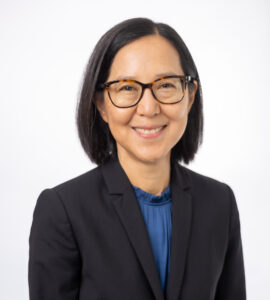 Clara Lee, MD, MPP, FACS, brings surgical and research experience with her return to UNC as Professor of Plastic & Reconstructive Surgery. Dr. Lee began work on an R21 NIH Grant on 2/1/24, and is progressing current work on an R01 and a sub-award on another R01. She discussed her grant and research work, background and individual talents in surgery, research, and teaching for this article.
Clara Lee, MD, MPP, FACS, brings surgical and research experience with her return to UNC as Professor of Plastic & Reconstructive Surgery. Dr. Lee began work on an R21 NIH Grant on 2/1/24, and is progressing current work on an R01 and a sub-award on another R01. She discussed her grant and research work, background and individual talents in surgery, research, and teaching for this article.
Dr. Lee’s Research
R01
Breast reconstruction after mastectomy is critical to comprehensive breast cancer treatment because it can restore quality of life and body image, which are often impaired after mastectomy. However, many patients are not offered reconstruction, especially those who identify as Black or Hispanic/Latina. Many patients lack knowledge about breast reconstruction risks, and their choices about reconstruction often misalign with their preferences. We have developed a breast reconstruction decision aid called BREASTChoice and demonstrated its efficacy and effectiveness in two randomized controlled trials. Like most decision aids, BREASTChoice’s implementation has been limited to clinical settings and had limited uptake. For dissemination of decision support to be successful, it must make decision support available how, when, and where people want to use it. Dissemination through social media within online communities could broaden the reach of BREASTChoice and other decision tools. Guided by the Designing for Dissemination paradigm, and in partnership with 3 cancer survivor and two clinician organizations, we propose to adapt BREASTChoice and disseminate it through social media within online communities. Upon completion of this project, we will have overcome a major scientific gap, the limited adoption of decision aids, and have developed a widely applicable approach to disseminating decision aids outside of clinical contexts.
R21
Spanish-speaking Latina women who undergo mastectomy are the least likely to undergo reconstruction, meet with a reconstructive surgeon, or receive enough information about reconstruction. Those who do not have reconstruction experience the highest rates of dissatisfaction and regret about their decisions. Persons diagnosed with cancer who primarily speak Spanish and identify as Latin American are less likely to receive guideline-concordant cancer treatments. In this study, we will adapt the BREASTChoice tool, resulting in the first culturally and linguistically relevant decision aid for breast reconstruction for Spanish speaking Latina breast cancer survivors. The decision aid’s format as a mobile friendly website will position it for wider dissemination and implementation because it will be portable and adaptable.
R01 Sub-award
Dr. Lee also recently received a sub award on an R01 NIH Grant from (Washington University (St. Louis). This work looks into tools and recommendations to better understand and adopt evidence-informed practices for consent in clinical trials.
Dr. Lee’s Background, Philosophy, and More
Your bring a depth of experience in both surgical practice and research investigation. What brought you to the Department of Surgery at UNC?
UNC has always been a special place for me. Dr. Greenberg has charged me with advancing health services research in the department.
What inspired you to become a doctor/surgeon?
I entered medical school thinking I would be a primary care doctor. But once I scrubbed in on a case, there was basically no going back. I just loved surgery and couldn’t get enough of it. I was that student who was tying knots on everything – chairs, books, sheets.
How did you decide to pursue your current specialty? Has it met your expectations?
I decided to become a reconstructive surgeon during my fourth year of general surgery residency. I realized that I loved putting things back together and wanted to be a surgeon who helped other surgeons. I love that I can help another surgeon do the operation they need to do. I can free them from being concerned about “getting it back together again”. That part is my responsibility, and I thrive on that.
Do you have any pre-surgery ritual?
I love the first scrub of the day! I find the process of scrubbing my hands sort of meditative. And that moment when you clean your hands is what transitions you from being “un-scrubbed” to being “scrubbed” and therefore deeply involved in the operation. That’s a sacred moment.
What are your contributions to your specialty?
I have mostly contributed through my research on decision making about breast reconstruction after mastectomy. I am a Director of the American Board of Plastic Surgery.
If you could pick the brain of someone alive or dead, who would it be?
My grandmother, who was the first woman physician in Korea.
What profession did you want to be when you were a kid?
I wanted to be a baker, but my mom said I would have trouble waking up early for it. The irony!
What is one thing you wish your patients or coworkers knew about you before they meet you?
I’m kind of shy, but I want to know you and hear from you.
If you give your younger self one piece of advice what would it be?
Be kind to people, including yourself.
What might someone be surprised to know about you?
I am a huge Star Wars fan. Huge.
What do you do when you aren’t working?
Watch Star Wars, hang out with my family, go for long walks, meditate, read, watch Carolina sports.
If you could have one superpower, what would it be and why?
I aspire to be gentle. It’s a work in progress.
Is there anything else you’d like colleagues, patients/loved ones to know?
I’m really grateful to be here.
Read more about Dr. Lee by visiting her UNC Surgery faculty profile.
